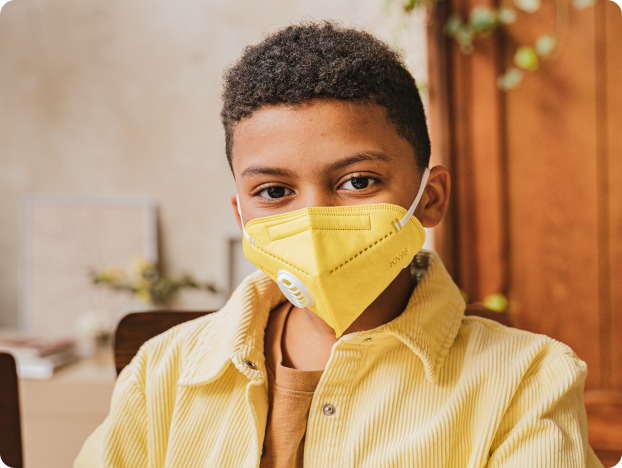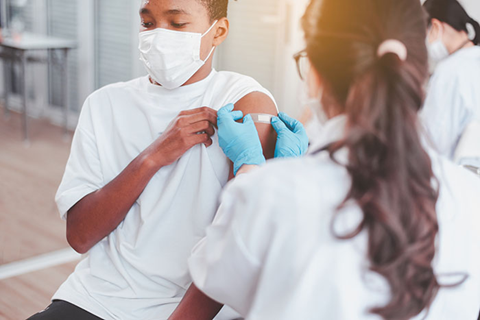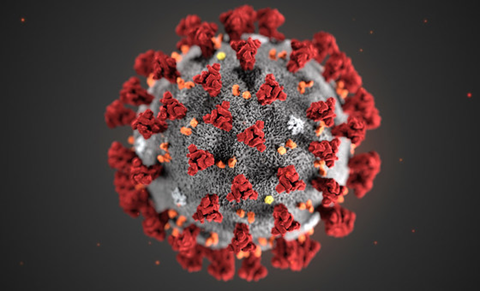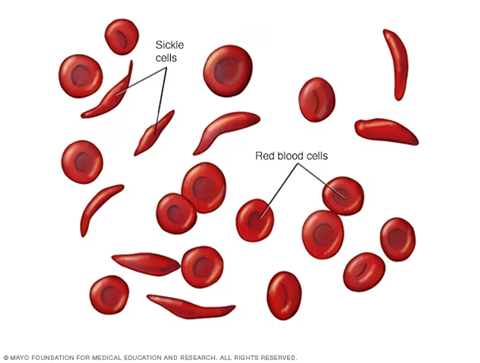

COVID-19 & SCD
Knowledge is power. We've gathered important information to help you and your loved ones affected by SCD feel empowered to make healthy decisions about COVID-19.
Symptoms
People with SCD experience the same symptoms as people without SCD.2
Symptoms range from mild to severe and may appear within 2-14 days after exposure to the virus.3
Symptoms may include
- Fever or chills
- Cough
- Shortness of breath or difficulty breathing
- Fatigue
- Muscle or body aches
- Headache
- New loss of taste or smell
- Sore throat
- Congestion or runny nose
- Nausea or vomiting
- Diarrhea
Complications
Stay Safe During Flu Season

Stay Safe During Flu Season
- To stay safe, limit high risk exposures by:
- Staying home if possible
- Social distancing
- Avoiding close contact with suspected infected persons
- Encourage frequent mask wearing
- Cover your sneezes and coughs by using the crook of your elbow
- Avoid touching your eyes, nose, and mouth with your hand (washed or unwashed)
- Healthy habits:
- Wash hands frequently and properly with soap and water for 20 seconds
- Use hand sanitizers if hand washing is not an option
- Maintain a healthy diet which includes fruits and vegetables
- Drink more water; 8-10 glasses a day
SCD Medications & Vaccines: What You Should Know

SCD Medications & Vaccines: What You Should Know
- Hydroxyurea
- Hydroxyurea will not interfere with the Covid vaccine and will not cause any terrible effects.
- Disease modifying therapies
- It is safe to continue other medications and therapies with the covid-19 vaccine including Ovoxelotor, crizulizumab, L-gluatmine and chronic transfusions
- Antibiotics
- You can continue on your course of antibiotics whilst receiving the covid-19 vaccine. There are no adverse interactions between the medications.
- Others
- Over-the-counter painkillers can be taken after covid-19 vaccine to relieve pain and fever from vaccine reactions.6
References:
- Panepinto, Julie A., et al. "Coronavirus disease among persons with sickle cell disease, United States, March 20–May 21, 2020." Emerging Infectious Diseases 26.10 (2020): 2473.
- Hoogenboom, Wouter S., et al. "Clinical outcomes of COVID-19 in patients with sickle cell disease and sickle cell trait: A critical appraisal of the literature." Blood reviews 53 (2022): 100911.
- National Center for Immunization and Respiratory Diseases, 2023
- Singh, Ashima, Amanda M. Brandow, and Julie A. Panepinto. "COVID-19 in individuals with sickle cell disease/trait compared with other Black individuals." Blood advances 5.7 (2021): 1915-1921.
- Umar, Zaryab, Usman Ilyas, and Nso Nso. "Sickle Cell Disease and COVID-19 Infection: Importance of COVID-19 Testing and Approach to Management." Cureus 14.3 (2022).
- Gross, P. A., et al. "Vaccine immune response and side effects with the use of acetaminophen with influenza vaccine." Clinical Diagnostic Laboratory Immunology 1.2 (1994): 134-138.

